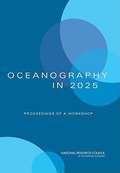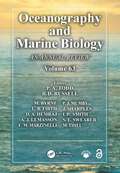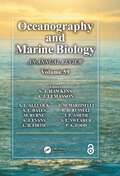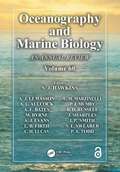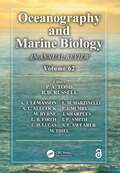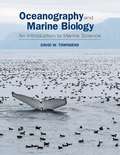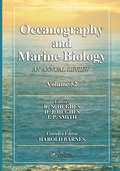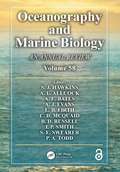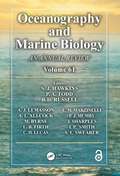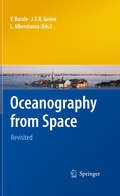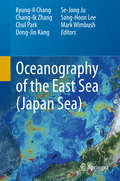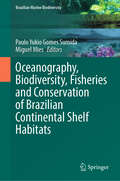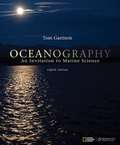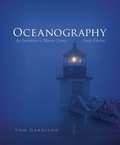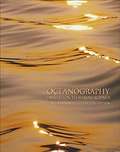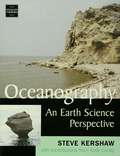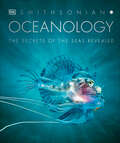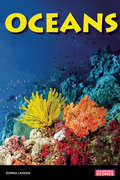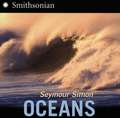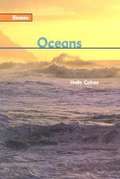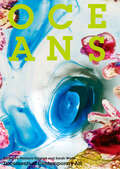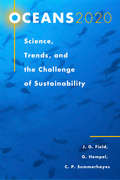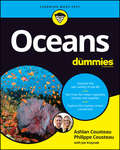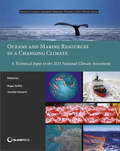- Table View
- List View
Oceanography In 2025: Proceedings Of A Workshop
by National Research Council of the National AcademiesOn January 8 and 9, 2009, the Ocean Studies Board of the National Research Council, in response to a request from the Office of Naval Research, hosted the "Oceanography in 2025" workshop. The goal of the workshop was to bring together scientists, engineers, and technologists to explore future directions in oceanography, with an emphasis on physical processes. The focus centered on research and technology needs, trends, and barriers that may impact the field of oceanography over the next 16 years, and highlighted specific areas of interest: submesoscale processes, air-sea interactions, basic and applied research, instrumentation and vehicles, ocean infrastructure, and education. To guide the white papers and drive discussions, four questions were posed to participants: What research questions could be answered? What will remain unanswered? What new technologies could be developed? How will research be conducted?
Oceanography and Marine Biology: An Annual Review (Oceanography and Marine Biology - An Annual Review)
by L. B. Firth I. P. Smith S. E. Swearer P. A. Todd M. Thiel B. D. Russell A. J. Lemasson M. Byrne E. M. Marzinelli P. J. Mumby J. Sharples D. A. HemrajThe ever-increasing interest in work in oceanography and marine biology and its relevance to global environmental issues, especially global climate change and its impacts, creates a demand for authoritative refereed reviews summarising and synthesising the results of both historical and recent research. Oceanography and Marine Biology: An Annual Review continues to answer that need after six decades of publication.Volume 63 features a review of the factors affecting resilience and recovery of the coral reefs of the Andaman Sea, a systematic review of the 2014-2016 Northeast Pacific marine heatwave, an exploration of coexisting mangrove-coral habitats, a discussion of the problems and solutions in European cephalopod fisheries, a dive into the aquaculture of Rabbit fishes, an examination of how historical land reclamation and coastal urbanisation continue to shape Britain’s Ocean City and, finally, an examination of transferable stressors in small cetaceans.An international Editorial Board ensures global relevance and expert peer review, with editors from Australia, Denmark, Hong Kong, Ireland, Singapore and the UK. The series volumes find a place in the libraries of not only marine laboratories and oceanographic institutes but also universities worldwide. Three of the seven peer-reviewed contributions in Volume 63 are available to read Open Access via the webpage and on OAPEN.Supplementary material is provided online on the Support Materials tab for Reviews 1, 2, 3, 5, 6 and 7.Chapters 1, 2 and 7 of this volume are freely available as a downloadable Open Access PDF at http://www.taylorfrancis.com under a Creative Commons [Attribution-Non Commercial-No Derivatives (CC-BY-NC-ND)] 4.0 license.
Oceanography and Marine Biology: An Annual Review, Volume 55 (Oceanography and Marine Biology - An Annual Review)
by S. J. HawkinsOceanography and Marine Biology: An Annual Review remains one of the most cited sources in marine science and oceanography. The ever-increasing interest in work in oceanography and marine biology and its relevance to global environmental issues, especially global climate change and its impacts, creates a demand for authoritative refereed reviews summarizing and synthesizing the results of recent research. If you are interested in submitting a review for consideration for publication in OMBAR, please email the Editor in Chief, Stephen Hawkins, at S.J.Hawkins@soton.ac.uk. For nearly 60 years, OMBAR has been an essential reference for research workers and students in all fields of marine science. This volume considers such diverse topics as the Great Barrier Reef Expedition of 1928-29, Mediterranean marine caves, macromedusae in eastern boundary currents, marine biodiversity in Korea, and development of a geo-ecological carbonate reef system model to predict responses of reefs to climate change. Seven of the peer-reviewed contributions in Volume 59 are available to read Open Access on this webpage (1, 2, 3, 4, 5, 6 and 9). An international Editorial Board ensures global relevance and expert peer review, with editors from Australia, Canada, Hong Kong, Ireland, Singapore and the United Kingdom. The series volumes find a place in the libraries of not only marine laboratories and oceanographic institutes, but also universities worldwide.
Oceanography and Marine Biology: An Annual Review, Volume 60 (Oceanography and Marine Biology - An Annual Review #60)
by S. J. HawkinsOceanography and Marine Biology: An Annual Review remains one of the most cited sources in marine science and oceanography. The ever-increasing interest in work in oceanography and marine biology and its relevance to global environmental issues, especially global climate change and its impacts, creates a demand for authoritative refereed reviews summarizing and synthesizing the results of both historical and recent research. This Volume celebrates 60 years of OMBAR, over which time it has been an essential reference for research workers and students in all fields of marine science. The peer-reviewed contributions in Volume 60 are available to read Open Access via this webpage and on OAPEN. If you are interested in submitting a review for consideration for publication in OMBAR, please email the Editor-in-Chief, Stephen Hawkins (S.J.Hawkins@soton.ac.uk) for Volume 61. For Volume 62 onwards, please email the new co-Editors in Chief, Dr Peter Todd (dbspat@nus.edu.sg) and Dr Bayden Russell (brussell@hku.hk). Volume 60 features an editorial on the UN Decade of Ocean Science and goes on to consider such diverse topics as Cenozoic tropical marine biodiversity, blue carbon ecosystems in Sri Lanka, marine litter and microplastics in the Western Indian Ocean, and the ecology and conservation status of the family Syngnathidae in southern and western Africa. This volume also contains a retrospective Prologue on the evolution of OMBAR and pays tribute to one of its early Editors in Chief, Margaret Barnes, by providing an update on her review in OMBAR of the stalked barnacle Pollicipes. Supplementary online videos as well as additional Tables and Appendices are available on the Support Tab of the book's Routledge webpage. An international Editorial Board ensures global relevance and expert peer review, with editors from Australia, Canada, Hong Kong, Ireland, Singapore and the UK. The series volumes find a place in the libraries of not only marine laboratories and oceanographic institutes, but also universities worldwide.
Oceanography and Marine Biology: An Annual Review, Volume 62 (ISSN)
by L. B. Firth I. P. Smith A. L. Allcock S. E. Swearer P. A. Todd M. Thiel B. D. Russell A. J. Lemasson M. Byrne C. H. Lucas E. M. Marzinelli P. J. Mumby J. SharplesOceanography and Marine Biology: An Annual Review remains one of the most cited sources in marine science and oceanography. The ever-increasing interest in work in oceanography and marine biology and its relevance to global environmental issues, especially global climate change and its impacts, creates a demand for authoritative refereed reviews summarising and synthesising the results of both historical and recent research.If you are interested in submitting a review for consideration for publication in OMBAR, please email the new co-Editors in Chief, Dr Peter Todd (dbspat@nus.edu.sg) and Dr Bayden Russell (brussell@hku.hk).Supplementary material is provided online on the Support Materials tab, for Reviews 2, 5, 6, 7, 8, 9 and 10.Volume 62 features a review of the biology, ecology and conservation threats to the Iberian harbour porpoise; a look at the potential risk to Mediterranean cetaceans and sea turtles from floating marine macro litter; an overview of the recent history and physical environment of corals in the Andaman Sea; an exploration of the population biology of Snapper fish in South Australia; and a review of historical killings of small cetaceans in the Northeast Atlantic and Mediterranean Sea, among others.An international Editorial Board ensures global relevance and expert peer review, with editors from Australia, Canada, Hong Kong, Ireland, Singapore and the UK. The series volumes find a place in the libraries of not only marine laboratories and oceanographic institutes but also universities worldwide. Chapters 1, 2, 4, 6, 8 and 9 of this volume are freely available as a downloadable Open Access PDF at http://www.taylorfrancis.com under a Creative Commons [Attribution-Non Commercial-No Derivatives (CC-BY-NC-ND)] 4.0 license.
Oceanography and Marine Biology: An Introduction to Marine Science
by David W. TownsendOceanography and Marine Biology preserves the basic elements of the physical, chemical, and geological aspects of the marine sciences, and merges those fundamentals into a broader framework of marine biology and ecology. Existing textbooks on oceanography or marine biology address the companion field only cursorily: very few pages in oceanography texts are devoted to marine biology, and vice versa. This new book overcomes that imbalance, bringing these disparate marine science text formats closer together, giving them more equal weight, and introducing more effectively the physical sciences by showing students with everyday examples how such concepts form the foundation upon which to build a better understanding of the marine environment in a changing world. Lecturer supplements will also be available.
Oceanography and Marine Biology: An annual review. Volume 52 (Oceanography and Marine Biology - An Annual Review)
by I. P. Smith R. N. Hughes D. J. HughesEver-increasing interest in oceanography and marine biology and their relevance to global environmental issues creates a demand for authoritative reviews summarising the results of recent research. Oceanography and Marine Biology: An Annual Review has catered to this demand since its founding by the late Harold Barnes fifty years ago. Its objective
Oceanography and Marine Biology: An annual review. Volume 58 (Oceanography and Marine Biology - An Annual Review #58)
by S. J. Hawkins, A. L. Allcock, A. E. Bates, A. J. Evans, L. B. Firth, C. D. McQuaid, B. D. Russell, I. P. Smith, S. E. Swearer, and P. A. ToddOceanography and Marine Biology: An Annual Review remains one of the most cited sources in marine science and oceanography. The ever-increasing interest in work in oceanography and marine biology and its relevance to global environmental issues, especially global climate change and its impacts, creates a demand for authoritative refereed reviews summarizing and synthesizing the results of recent research. For more than 50 years, OMBAR has been an essential reference for research workers and students in all fields of marine science. If you are interested in submitting a review for consideration for publication in OMBAR, please email the Editor in Chief, Stephen Hawkins, at S.J.Hawkins@soton.ac.uk. This volume considers such diverse topics as optimal design for ecosystem-level ocean observatories, the oceanography and ecology of Ningaloo, human pressures and the emergence of novel marine ecosystems and priority species to support the functional integrity of coral reefs. Six of the nine peer-reviewed contributions in Volume 58 are available to read Open Access via the links on the Routledge.com webpage. An international Editorial Board ensures global relevance and expert peer review, with editors from Australia, Canada, Hong Kong, Ireland, Singapore, South Africa and the United Kingdom. The series volumes find a place in the libraries of not only marine laboratories and oceanographic institutes, but also universities worldwide. Chapters 1, 2, 3, 4, 5, 7, and 8 of this book are freely available as downloadable Open Access PDFs at http://www.taylorfrancis.com under a Creative Commons Attribution-Non Commercial-No Derivatives (CC-BY-NC-ND) 4.0 license.
Oceanography and Marine Biology: An annual review. Volume 61 (Oceanography and Marine Biology - An Annual Review #61)
by S. J. Hawkins L. B. Firth I. P. Smith A. L. Allcock S. E. Swearer P. A. Todd B. D. Russell A. J. Lemasson M. Byrne C. H. Lucas E. M. Marzinelli P. J. Mumby J. SharplesOceanography and Marine Biology: An Annual Review remains one of the most cited sources in marine science. The increasing interest in work in oceanography and marine biology and its relevance to global environmental issues, especially global climate change and its impacts, creates a demand for authoritative refereed reviews summarising and synthesising the results of both historical and recent research. For more than 50 years, OMBAR has been an essential reference for researchers, students and workers in all fields of marine science. An international Editorial Board ensures global relevance and expert peer review, with editors from Australia, Hong Kong, Ireland, Singapore, and the UK. The series of volumes can be found in the libraries of institutes and universities worldwide. Five of the seven peer-reviewed contributions in Volume 61 are available to read Open Access via this webpage and on OAPEN. Supplementary material is provided online on the Support Materials tab on the book’s www.routledge.com webpage for Reviews 1, 2, 4, 5 and 6.. Volume 61 features a review of 100 years of daily sea surface temperature from the Hopkins Marine Station in Pacific Grove, California; an exploration of the biology and life cycle of enigmatic crustacean y-larvae; a review of the science, policy and management of the Central and South Atlantic Deep Sea benthos; a review of the biodiversity of the Irish-Scottish continental margin; an investigation of how new molecular tools can be used for marine biodiversity and ecosystem assessments, and a look at the resilience of marine organisms to climate change. A final monograph considers enemy shells as refugia from grazing and competition pressure. If you are interested in submitting a review for consideration for publication in OMBAR, please email the new co-Editors in Chief, Dr Peter Todd (dbspat@nus.edu.sg) and Dr Bayden Russell (brussell@hku.hk). Guidelines for contributors to OMBAR, including information on illustration requirements, can be downloaded on the "Support Material" tab on the latest volume’s webpage.
Oceanography from Space
by J.F.R. Gower L. Alberotanza Vittorio BaraleThis Volume collects a series of key-note lectures delivered at the fourth "Oceans from Space" Symposium, held in Venice, Italy, in 2010. The revisited postscript in the title identifies it as the ideal follow-up of the legendary Oceanography from Space, edited by J.F.R. Gower and published in 1980, following the very first edition of "Oceans from Space". This series of conferences, which are held every 10 years only, is designed as a periodical state-of-the-art review of satellite oceanography, providing both an outline of current research, as well as a forum to debate topical issues. The "Oceans from Space" Venice 2010 lectures, authored by a unique group of prominent scientists, address virtually every facet of oceanographic remote sensing. All salient marine applications of passive and active techniques are covered in the present collection. The main results already achieved, or soon to come, demonstrate the potential of Earth Observations to help explore the dynamical and bio-geo-chemical features of the World's Oceans. V. BARALE graduated in Physics in 1977, from the University of Milan, and then received both his M.S., in 1982, and Ph.D., in 1986, at the Scripps Institution of Oceanography, from the University of California at San Diego. Since 1990 he has been with the Joint Research Centre of the European Commission. His research focuses on the ecological assessment of marginal and enclosed (European) seas, using optical remote sensing. J.F.R. GOWER received his Ph.D. in Radio Astronomy in 1966 at the University of Cambridge, England, after graduating in Natural Sciences from the same University in 1962. He moved to Canada and joined the University of British Columbia in 1967. Since 1971 he has been at the Institute of Ocean Sciences, where he worked on optical, SAR and altimeter satellite data. He originated the "Oceans from Space" Conference series. L. ALBEROTANZA graduated in Geology in 1969 at the University of Padova. His career developed at the Consiglio Nazionale delle Ricerche (CNR), in Venice, where he has done research on optical remote sensing of marine, coastal and lagoon areas. He has been Director of the Venice CNR Institute, Professor at the University of Venice, and is now President of the Venice City Council Tidal Forecasting and Early Warning Centre.
Oceanography of the East Sea (Japan Sea)
by Kyung-Il Chang Chang-Ik Zhang Chul Park Dong-Jin Kang Se-Jong Ju Sang-Hoon Lee Mark WimbushThis book reviews the research in various fields of oceanography on the responses of the East Japan Sea to climate change. The uniqueness of the East Japan Sea comes from the rapid and amplified response to climate change, which includes long-terms trends of physical and chemical parameters at a rate that almost doubles or even higher the global rate. This book aims to provide in an organized way the results from the previously published knowledge but also to introduce an updated view of the research recently carried out. The book is divided into several parts that comprise the physical, chemical, biological, and geological aspects of the region and fisheries. This book is made for researchers and students working on climate variability as well as for the oceanography community working on world's marginal seas. The research presented in this work will also benefit to researchers from other fields such as social scientists and environmentalists, and also policy makers.
Oceanography, Biodiversity, Fisheries and Conservation of Brazilian Continental Shelf Habitats (Brazilian Marine Biodiversity)
by Paulo Yukio Gomes Sumida Miguel MiesBesides the coastline, the continental shelf is one of the most impacted marine habitats along the Brazilian coast. Not only fisheries but also oil and gas industries, shipping, and litter represent important threats to the marine biodiversity. Different geomorphological structures comprise the seascape that harbors not only a huge biodiversity, but also important regulating services.
Oceanography: An Invitation To Marine Science
by Tom S. GarrisonCengage Learning in partnership with National Geographic Society brings course concepts to life with interactive learning, study, and exam preparation tools along with market leading text content for introductory oceanography courses. OCEANOGRAPHY provides a basic understanding of the scientific questions, complexities, and uncertainties involved in ocean use, as well as the role and importance of the ocean in nurturing and sustaining life on the planet. Bestselling author Tom Garrison emphasizes the interdisciplinary nature of marine science, stressing its links to biology, chemistry, geology, physics, meteorology, astronomy, ecology, history, and economics. Enable your students to purchase the right solution to meet their needs, whether it's a traditional printed text, all digital learning platform, or package that includes the best of both worlds. With the recently updated Oceanography 8th Edition and CourseMate's interactive teaching and learning tools, it's never been easier to help students understand the complexities involved in how we study and use the ocean.
Oceanography: An Invitation to Marine Science
by Tom GarrisonGarrison (Orange Coast College) covers the fundamentals of oceanography, including the history of marine science, earth structure and plate tectonics, seawater chemistry, and ocean physics. The textbook also discusses atmospheric circulation and weather, wave dynamics and wind waves, plant and animal life, marine communities, marine resources, and environmental concerns. Appendixes feature information on measures and conversions, geological time, latitude and longitude, maps and charts, taxonomic classification of marine organisms, careers in marine science, and calculating tide-generating force. Included is a CD-ROM with on-line materials for each chapter and other resources. Annotation c. Book News, Inc. , Portland, OR (booknews. com)
Oceanography: An Invitation to Marine Science
by Tom S. GarrisonThe ocean affects all aspects of our lives--Tom Garrison will show you how in this new edition of OCEANOGRAPHY: AN INVITATION TO MARINE SCIENCE. Garrison takes you on a vivid exploration of the ocean--from submarine canyons to zooplankton, global warming, the growing plastics problem, and our changing coastlines--and explains oceanography's most important concepts. Garrison's friendly approach helps you understand the complexities involved in how we study and use the ocean. You'll explore topics like Hurricane Katrina; the devastating December 2004 earthquake in the Indian Ocean and the resulting tsunami; the Moon and its connection to the ocean; the power of the ocean to influence weather; and uses and abuses of the ocean. Gain an understanding of the wonders of the sea and the scientific questions that surround it with this fascinating text!
Oceanography: An Invitation to Marine Science (4th edition)
by Tom GarrisonThis edition provides an interesting, clear, current, and reasonably comprehensive overview of the marine sciences and is designed for college and university students who are curious about Earth's largest feature, but who may have little formal background in science.
Oceanography: an Earth Science Perspective
by Steve Kershaw Dr Andy Cundy Andy CundyThis work provides a wide perspective of the oceans by examining their places in the earth sciences, drawing together all the key strands of ocean study and presenting a holistic view of ocean processes, ancient and modern.
Oceanology: The Secrets of the Sea Revealed (DK Secret World Encyclopedias)
by DKDive into this uniquely elegant visual exploration of the sea An informative and utterly beautiful introduction to marine life and the ocean environment, Oceanology brings the riches of the underwater world onto the printed page.Astounding photography reveals an abundance of life, from microscopic plankton to great whales, seaweed to starfish. Published in association with the Smithsonian Institution, the book explores every corner of the oceans, from coral reefs and mangrove swamps to deep ocean trenches. Along the way, and with the help of clear, simple illustrations, it explains how life has adapted to the marine environment, revealing for example how a stonefish delivers its lethal venom and how a sponge sustains itself by sifting food from passing currents. It also examines the physical forces and processes that shape the oceans, from global circulation systems and tides to undersea volcanoes and tsunamis.To most of us, the marine world is out of reach. But with the help of photography and the latest technology, Oceanology brings us up close to animals, plants, and other living things that inhabit a fantastic and almost incomprehensibly beautiful other dimension.
Oceans
by Donna LathamInvestigating the planet's biomes and examining the modern threats to each ecosystem, this interactive series challenges young readers to look at how their own actions affect the planet's health. With compare-and-contrast facts and vocabulary-building sidebars, each engaging guide reveals how environmental threats-both human and natural-affect plants and animals.Detailing the largest biome, this guide surveys the environmental threats to the earth's oceans. Teaching students about coral reefs-the rainforests of the ocean-this educational resource explores topics such as the connection between increasing levels of carbon dioxide in the atmosphere and the bleaching of the reefs. By comparing the size of an island of floating plastic and other trash in the middle of the Pacific Ocean to the state of Texas-and how that floating island impacts ocean life-the guide shows young environmentalists why consuming less plastic is important.
Oceans
by Seymour SimonText and photographs explore the physical characteristics, life forms, and fragility of the world's oceans. Exceptional nonfiction for children from two of the most trusted names in science education: Seymour Simon and the Smithsonian Institution.
Oceans (Whitechapel: Documents of Contemporary Art)
by Sarah Wade Pandora SyperekOCEANS attends to the inextricable human and nonhuman agencies that affect and are affected by the sea and its running currents within contemporary art and visual culture.Oceans cover more than 70 percent of the Earth&’s surface, dividing and connecting humans, who carry saltwater in their blood, sweat and tears. They also represent a powerful nonhuman force, rising, flooding, heating and raging in unprecedented ways as the climate crisis unfolds. Artists have envisioned the sea as a sublime wilderness, home to mythical creatures and bizarre species, a source of life and death, a site of new beginnings and tragic endings, both wondrous and disastrous. From migration to melting ice caps, the sea is omnipresent in international news and politics, leaking into popular culture and proliferating in recent art and exhibitions. This anthology gathers artists and writers to address the ocean not only as a theme but as a major agent of artistic and curatorial methods.Artists surveyed includeBas Jan Ader, Eileen Agar, John Akomfrah, Heba Y. Amin, Shuvinai Ashoona, Betty Beaumont, Leopold & Rudolf Blaschka, Heidi Bucher, Marcus Coates, Tacita Dean, Chris Dobrowolski, Léuli Eshrāghi, Ellen Gallagher, Ayesha Hameed, Barbara Hepworth, Klara Hobza, Isuma, Brian Jungen, Tania Kovats, Sonia Levy, Armin Linke, Lani Maestro, Ana Mendieta, Kasia Molga, Eleanor Morgan, Wangechi Mutu, Saskia Olde Wolbers, Jean Painlevé and Geneviève Hamon, Allan Sekula, Shimabuku, Ahren Warner, Christine & Margaret Wertheim, Alberta WhittleWriters include Stacy Alaimo, Bergit Arends, Erika Balsom, Karen Barad, Rachel Carson, Mel Y. Chen, T.J. Demos, Marion Endt-Jones, Kodwo Eshun, Paul Gilroy, Stefano Harney, Epeli Hau&’ofa, Donna Haraway, Eva Hayward, Stefanie Hessler, Luce Irigaray, Zakiyyah Iman Jackson, Celina Jeffery, Melody Jue, Max Liboiron, Lana Lopesi, Chus Martínez, Jules Michelet, Fred Moten, Astrida Neimanis, Celeste Olalquiaga, Ralph Rugoff, John Ruskin, Marina Warner, Jan Verwoert
Oceans 2020: Science, Trends, and the Challenge of Sustainability
by John G. Field Colin P. Summerhayes Gotthilf HempelOceans 2020 presents a comprehensive assessment of the most important science and societal issues that are likely to arise in marine science and ocean management in the next twenty years. Sponsored by the Intergovernmental Oceanographic Commission (IOC), the Scientific Committee on Oceanic Research (SCOR), and the Scientific Committee on Problems of the Environment (SCOPE), the book brings together the world's leading ocean scientists and researchers to analyze the state of marine science and technology, identify key scientific issues for sustainable development, and evaluate the capability of scientists, governments, and private-sector stakeholders to respond to those issues. Topics include: basic ocean sciences; pressures on the coastal zone; climate change and the ocean; fisheries and fishery science in their search for sustainability; offshore industries including oil drilling, carbon sequestration, and manganese nodule mining; and marine information for shipping and defense. Also included are chapters on cross-cutting issues including operational oceanography, ocean instrumentation and technology, developing frameworks for cooperation, and capacity building in developing nations. In addition, the book offers an introductory overview and a "Vision to 2020" that outlines a path to rational ocean governance. In each chapter, contributors give a brief but comprehensive overview of the subject and then consider what has been achieved in recent years, define the problems, outline solutions, and set forth recommendations on the needs for and directions of ocean science in support of sustainable development for the next twenty years.Oceans 2020 suggests what can be done about major marine environmental issues through the better development and application of marine science and technology, focusing on the issues that are most closely related to human and sustainable development.
Oceans For Dummies
by Joseph Kraynak Philippe Cousteau Ashlan CousteauDive deep to explore the ocean From how most of our oxygen is created by phytoplankton, to how currents control our climate, to the marine food chain and the importance of coral, this is the holy grail of ocean books that’s easy for everyone to digest. It features fun facts about some of the most incredible, bizarre, and fascinating creatures in the ocean, from mantis shrimp that can strike things with the speed of a .22 caliber bullet to fish with clear heads that can see out of the top of their skulls. The ocean is full of wonders and there is still so much left to explore and understand. How our oceans work What creatures live in the ocean Find out how the ocean regulates our climate and weather patterns How growing pollution threatens our ocean and its inhabitants Oceans For Dummies is perfect for anyone with an interest in the ocean, including kids, adults, students, ocean lovers, surfers, fishermen, conservationists, sailors, and everyone in between.
Oceans and Marine Resources in a Changing Climate
by Roger Griffis Jennifer HowardPrepared for the 2013 National Climate Assessment and a landmark study in terms of its breadth and depth of coverage, Oceans and Marine Resources in a Changing Climate is the result of a collaboration among numerous local, state, federal, and nongovernmental agencies to develop a comprehensive, state of the art look at the effects of climate change on the oceans and marine ecosystems under U. S. jurisdiction. This book provides an assessment of scientific knowledge of the current and projected impacts of climate change and ocean acidification on the physical, chemical, and biological components and human uses of marine ecosystems under U. S. jurisdiction. It also provides assessment of the international implications for the U. S. due to climate impacts on ocean ecosystems and of efforts to prepare for and adapt to climate and acidification impacts on ocean ecosystem, including · Climate-Driven Physical and Chemical Changes in Marine Ecosystems · Impacts of Climate Change on Marine Organisms · Impacts of Climate Change on Human Uses of the Ocean · International Implications of Climate Change · Ocean Management Challenges, Adaptation Approaches, and Opportunities in a Changing Climate · Sustaining the Assessment of Climate Impacts on Oceans and Marine Resources Rich in science and case studies, it examines the latest climate change impacts, scenarios, vulnerabilities, and adaptive capacity and offers decision makers and stakeholders a substantial basis from which to make informed choices that will affect the well-being of the region's inhabitants in the decades to come.
